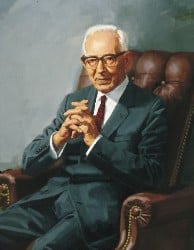As for William E. McLellin, his conduct, though kind, was very peculiar. He, it will be remembered, was one of the original Twelve Apostles, chosen in 1835, but excommunicated with David Whitmer and others for apostasy a few years later. He treated Brother Pratt and myself with every consideration, fairly gluing himself to our society as long as we remained at Independence, acting as our guide in visiting every point of interest in that historic town, loitering about our hotel while we took our meals, and waiting to rejoin us at every possible opportunity. He was full of reminiscences, but seemed to be all unsettled in his feelings and convictions, at one moment praising the Prophet Joseph to the skies, and at the next casting reflections upon him and the other Church leaders of his period. I never saw the sad effects of apostasy more plainly manifested. He stated that he was writing a book about his early connection with the Church, but I have never learned that he completed it. When we departed he accompanied us to the railroad station and stood gazing after us until our train disappeared in the distance. I corresponded with him afterwards as long as he lived.
Joseph Fielding Smith
| “Reminiscences by the First Presidency, Dec. 21, 1901; Pres. Joseph F. Smith, Pres. John R. Winder, Pres. Anthon H. Lund; Deseret News, December 21, 1901, p. 57
Topics: Apostate
